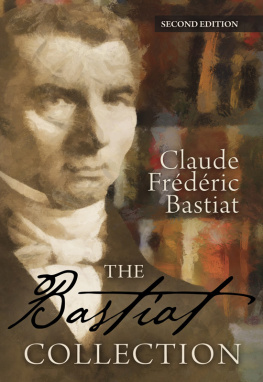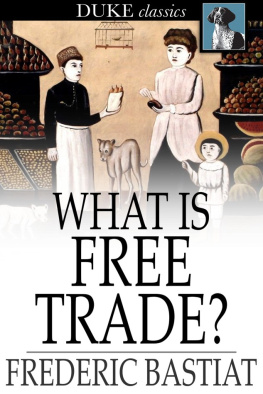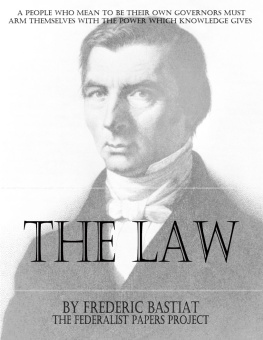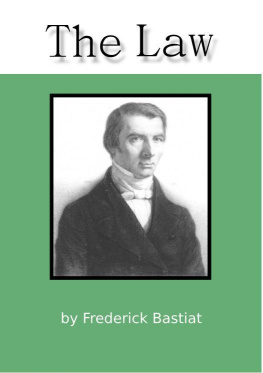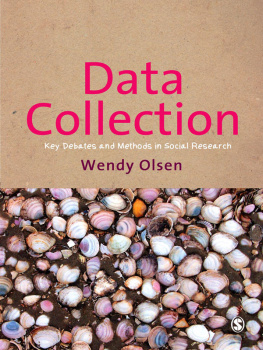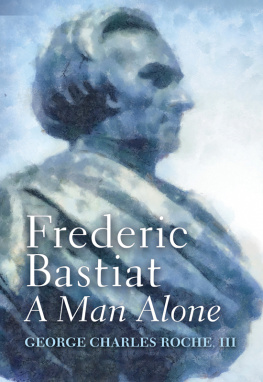THE BASTIAT COLLECTION
THE BASTIAT COLLECTION
FRDRIC BASTIAT
SECOND EDITION


2-volume hardback Copyright 2007 Ludwig von Mises Institute
Pocket paperback edition Copyright 2011 Ludwig von Mises Institute and published under the Creative Commons Attribution License 3.0.
http://creativecommons.org/licenses/by/3.0/
Published by Ludwig von Mises Institute
518 West Magnolia Avenue
Auburn, Alabama 36832
Mises.org
ISBN: 978-1-61016-200-5
The Ludwig von Mises Institute dedicates this volume
to all of its generous donors, and in particular
wishes to thank these Patrons:
Legatum Global Development
Douglas E. French and Deanna Forbush
Robert L. Luddy

Mr. and Mrs. Jeremy S. Davis
In memory of Mr. and Mrs. Harry G. Guthmann
Don Printz, M.D.
Hall McAdams
CONTENTS
INTRODUCTION
And now I would appeal with confidence to men of all schools, who prefer truth, justice, and the public good to their own systems. Economists! Like you, I am the advocate of LIBERTY; and if I succeed in shaking some of these premises which sadden your generous hearts, perhaps you will see in this an additional incentive to love and to serve our sacred cause.
Bastiat, To the Youth of France,
Economic Harmonies, p. 14
C laude Frdric Bastiat was born in Bayonne, France on June 29th, 1801. He was orphaned at age 9 and raised by relatives. He worked in his uncles accounting firm and then became a farmer when he inherited his grandfathers farm. After the middle-class Revolution of 1830, Bastiat became politically active and was elected Justice of the Peace in 1831 and to the Council General (county-level assembly) in 1832. He was elected to the national legislative assembly after the French Revolution of 1848. Bastiat was inspired by and routinely corresponded with Richard Cobden and the English Anti-Corn Law League and worked with free-trade associations in France. Bastiat wrote sporadically starting in the 1830s, but in 1844 he launched The bulk of his remarkable writing career that so inspired the early generation of English translatorsand so many moreis contained in this collection.
If we were to take the greatest economists from all ages and judge them on the basis of their theoretical rigor, their influence on economic education, and their impact in support of the free-market economy, then Frdric Bastiat would be at the top of the list. As Murray N. Rothbard noted:
Bastiat was indeed a lucid and superb writer, whose brilliant and witty essays and fables to this day are remarkable and devastating demolitions of protectionism and of all forms of government subsidy and control. He was a truly scintillating advocate of an untrammeled free market.
This book brings together his greatest works and represents the early generation of English translations. These translators were like Bastiat himself, people from the private sector who had a love of knowledge and truth and who altered their careers to vigorously pursue intellectual ventures, scholarly publishing, and advocacy of free trade.
This collection represents some of the best economics ever written. He was the first, and one of the very few, to be able to convincingly communicate the basic propositions of economics. The vast majority of people who have learned anything about economics have relied on Bastiat or publications that were influenced by his work. This collectionpossibly more than anything ever written about economicsis the antidote for economic illiteracy regarding such things as the inadvisability of tariffs and price controls, and everyone from the novice to the Ph.D. economist will benefit from reading it.
The collection consists of three sections, the first of which contains his best-known essays. In That Which is Seen, and That Which is Not Seen, Bastiat equips the reader to become an economist in the first paragraph and then presents the story of the broken window where a hoodlum is thought to create jobs and prosperity by breaking windows. Bastiat solves the quandary of prosperity via destruction by noting that while the apparent prosperity is seen, what is unseen is that which would have been produced had the windows not been broken. According to Rothbard:
In this way, the economist, Bastiats third-level observer, vindicates common sense and refutes the apologia for destruction of the pseudo-sophisticate. He considers what is not seen as well as what is seen. Bastiat, the economist, is the truly sophisticated analyst.
Professor Jrg Guido Hlsmann credits Bastiat for discovering this counterfactual method, which allowed Bastiat to show that destruction (and a variety of government policies) is actually the path to poverty, not prosperity. This lesson is then applied to a variety of more complex cases and readers will never be able to deny that scarcity exists and will alwayshopefullyremember that every policy has an opportunity cost. If nothing else, they will not believeas is often claimedthat earthquakes, hurricanes, and wars lead to prosperity. The remaining essays cover the important institutions of societylaw, government, money, and capitalwhere Bastiat explains the nature of these institutions and disabuses the reader of all the common misconceptions regarding them.
The second section is Bastiats Economic Sophisms, a collection of 35 articles on the errors of protectionism broadly conceived. Here Bastiat shows his mastery of the methods of argumentationusing basic logic and taking arguments to their logical extremeto demonstrate and ridicule them as obvious fallacies. In his Negative Railroad Bastiat argues that if an artificial break in a railroad causes prosperity by creating jobs for boatmen, porters, and hotel owners, then there should be not one break, but many, and indeed the railroad should be just a series of breaksa negative railroad. In his article An Immense Discovery! he asks, would it not be easier and faster simply to lower the tariff between points A and B rather than building a new railroad to transport products at a lower cost? His Petition of the Candlemakers argues in jest that a law should be passed to require that all doors and windows be closed and covered during the day to prevent the sun from unfairly competing with the makers of candles and that if such a law were passed it would create high-paying jobs in candle and candlestick making, oil lamps, whale oil, etc. and that practically everyone would profit as a result.
The third section is Bastiats Economic Harmonies which was hastily written before his death in 1850 and is considered incomplete. Here he demonstrates that the interests of everyone in society are in harmony to the extent that property rights are respected. Because there are no inherent conflicts in the market, government intervention is unnecessary. The borrower wants lenders to thrive so that loans will be available and the lender wants borrowers to thrive in order to collect interest on savings and to be paid back the loan principal. This book is the basis of charges that critics have levied against Bastiat, claiming that he made theoretical errors and failed to extend the corpus of theory. I have shown elsewhere that these criticisms must represent a misreading of Bastiat, and Rothbard showed that Bastiat made the vital contribution of returning economics to a focus on wants,
In a more recent and very important reappraisal of Bastiat, Professor Hlsmann has shown my suspicions to be correct.
Next page
